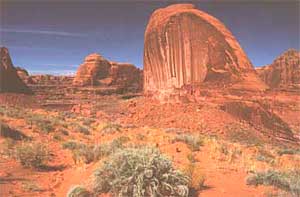|
Support Swells for Wild Utah
But Utah delegation, Bush administration stand in the way
By Tom Valtin
Not a single member of Utah's congressional delegation supports America's Redrock Wilderness Act, the Utah wilderness bill expected shortly to be reintroduced to Congress. Yet polls show that Utah residents strongly favor more designated wilderness in their state.
"The Utah delegation tends to hew to the old pioneer credo that land must be made 'productive,'" says Bob Jordan, chair of the Sierra Club's Utah Wilderness Task Force. "But the 'use it or lose it' ethos no longer reflects the realities or demographics of modern-day Utah."

Half Dome in the Desert: Unique redrock wildlands like these would be protected as part of America's Redrock Wilderness Act. |
A 1999 poll by Dan Jones and Associates found that, on average, Utahns favored protecting 65 percent of the state's Bureau of Land Management (BLM) land as wilderness, which translates into 14.9 million acres. Nationally, a 1999 Mellman Group poll found that Americans favored designating "more than two-thirds" of the BLM's 23 million acres in Utah as wilderness.
Since for the past decade no congressional representative from the Beehive State has seen fit to support a strong Utah wilderness bill, the cause has been championed by Representative Maurice Hinchey (D-N.Y.) and Senator Richard Durbin (D-Ill.). The Redrock Wilderness Act had 144 cosponsors in the House and 12 in the Senate in the 107th Congress.
The Utah delegation is the most significant obstacle to getting the bill passed; others include opposition from the Bush administration and its allies in Congress; the extractive industries, which wield clout out of proportion with the value of oil, gas, and mineral exploration to Utah's economy; and off-road vehicle users.
Last year, in an internal memo, the Bush administration directed the Utah BLM to make the issuance of oil and gas permits its top priority. Since then, 50,000-pound "thumper trucks," whose tires are taller than the average human, have been tearing through wildlife habitat, vibrating, or "thumping" atop thousands of "source points" for oil and gas.
The most insidious threat, however, comes from an administration decision to open long-abandoned mining trails, cattle paths, and wagon roads to ORVs. This Interior Department rule change, issued in January, makes it easier for states and local governments to claim rights of way on hundreds of millions of acres of BLM lands, as well as national parks, wildlife refuges, and designated wilderness. This change revives a provision of the 1866 Mining Act known as Revised Statute 2477, originally designed to promote settlement in the West.

Lawson LeGate |
 |
"Let's say I'd driven an ORV up and down a roadless canyon a few times," explains Lawson LeGate of the Sierra Club's Salt Lake City office. "Under RS2477, the administration would say I had created a right of way. It has long been the goal of anti-wilderness forces to use this law as a loophole to open up roads across public lands."
Jim Catlin, member of the Sierra Club Board of Directors, says wilderness foes are using "words of mass deception." He says they aren't talking about RS2477 as a tool to oppose wilderness, but "in reality it's a very effective way to break up wilderness areas. It's a huge giveaway."
Heidi McIntosh of the Southern Utah Wilderness Alliance (SUWA) says, "I can't think of another initiative the administration is pursuing that would have a more lasting and significant impact on public lands."
Another obstacle to wilderness designation is an anti-federal, "anti-outsider" mindset that still prevails in parts of Utah. Sierra Club staffer Eric Larra recently encountered this when he and his wife stopped into a southern Utah watering hole after a day of hiking. After 20 minutes of friendly conversation, the proprietor asked him what he did for work. When Larra, who speaks with a slight European accent, replied, the proprietor told him he and his wife would have to leave. "My family's been here for generations, and we're sick and tired of outsiders and foreigners coming in here with their big money and telling us what to do."
But attitudes are changing, says LeGate. "Had he been at any number of other establishments, in any number of other towns, the news that he worked for the Sierra Club would have been received warmly."
The foundations of Utah's economy are also changing. Tourism and technology are among the largest and most important economic activities, far exceeding extractive industries such as mining and oil-and-gas development. Utah's scenery and recreational opportunities have been among the state's top draws in recent years, and a strong wilderness bill will help keep the state an attractive place to live, work, and vacation.
A leader in promoting the Redrock Wilderness Act is the Utah Wilderness Coalition (UWC). Formed in 1985 by members of the Sierra Club, the Wilderness Society, and other groups, the coalition came together in response to a BLM inventory of its Utah holdings that found fewer than 1 million acres of "potential wilderness." This affront prompted citizens to conduct their own "on-the-ground" inventory.
The result was a "Citizens' Proposal" calling for some 5 million acres of wilderness, and in 1989 the Citizens' Proposal was introduced in Congress by Representative Wayne Owens (D-Utah) as the Utah Wilderness Act. Upon completion of a second citizen inventory in 1999, the bill was updated to embrace 9.1 million acres and reintroduced as America's Redrock Wilderness Act. The Dan Jones poll conducted that year found that Utahns preferred the Citizens' Proposal to a 2-million-acre proposal from the Utah congressional delegation by a 23-point margin.

Rocking Out: Bob Jordan, chair of the Sierra Club's Utah Wilderness Task Force, on a recent hiking trip to Slick Rock Canyons, Escalante, Utah. |
One of the movers and shakers within the UWC is the Southern Utah Wilderness Alliance, or SUWA. "Ken Venables at UWC and Dave Pacheco of SUWA had the idea of forming activist groups in several states," explains Bob Jordan, himself a New York resident. "They'd contact Sierra Club members in a given area and schedule a slide show. Following their presentation they'd ask, 'Why don't you start a group?' A couple years ago we had the idea of gathering more groups together as state activist groups, and there are now 25 such groups nationwide.
"People sometimes forget that public lands don't belong to individual states," says Jordan, "they belong to all Americans. Everyone who pays taxes is contributing to maintaining Utah's public lands. We're all entitled to a say in how these lands are managed." At this writing, some 243 local, regional, and national groups have endorsed the Redrock Wilderness Act by joining the UWC.
One of the Sierra Club's contributions to the Utah effort has been the Adopt-a-Wilderness Program, which encourages "adopters" to get to know a potential wilderness area and establish a relationship with the local BLM office in charge of that "unit." In an effort to build national support, each Utah adopter is encouraged to pair with an out-of-state adopter to advocate for that area.
The Redrock Wilderness Act may not come to a vote until at least one member of the Utah congressional delegation supports it. But as more and more Utahns come to favor a strong wilderness bill, that time may be fast approaching.
"It takes time to get a bill like this passed," says LeGate, "but it's a fight we're in for the long haul."
Take Action:
Write to your senators and representative in Congress, urging them to cosponsor America's Redrock Wilderness Act.
Write letters to the editor saying that we, as American citizens, are all proud co-owners of these magnificent lands, and they should be protected.
Contact your local Sierra Club chapter or group, or visit www.sierraclub.org/wildlands/utahwilderness. Ask about the Adopt-a-Wilderness program. Join one of the Club's state activist groups.
Contact the Utah Wilderness Coalition (www.uw coalition.org), the Southern Utah Wilderness Alliance (www.suwa.org), or the Wildlands Center for Preventing Roads (www.wildlandscpr.org).
Up to Top
|